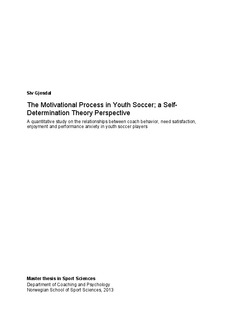| dc.description.abstract | With regard to the physical, social and psychological benefits (Sallis & Patrick, 1994; Larson, 2000), youth sport participation becomes imperative to facilitate and encourage. In order to do so, it is crucial to further our understanding of what motivates sports participation, and how it can be influenced. The current study entailed a cross-sectional test of the motivational process in youth soccer, grounded in two sub-theories of Self- Determination Theory (Deci & Ryan, 2000); Cognitive Evaluation Theory (CET) and Basic Needs Theory (BNT). The relationships between two coaching interpersonal styles; autonomy-support and controlling, and need satisfaction were examined, and in turn how the satisfaction of needs relate to enjoyment and performance anxiety was explored. The sample consisted of 1397 (814 male, 576 female, 7 unspecified) youth soccer players (M = 13.96, SD = 1.35). The participants completed a questionnaire containing soccer-contextualized measures of the variables of interest. Structural equation modeling analysis showed that athletes’ perception of coach autonomy-support and control were both positively linked to the satisfaction of the need for autonomy, competence, and relatedness. The satisfaction of the need for competence emerged as the only basic need related to enjoyment and performance anxiety. In further analysis, competence partly mediated the relationships between the coaching styles and the two outcome variables. A sequential model of the process was created to illustrate the relationships. The results suggest that the coach created environment is important in satisfying basic needs, and that a controlling interpersonal style may also allow for this satisfaction. The findings highlight the importance of competence for the quality of the sporting experience for youth athletes. Finally, the study provides support for the theorized motivational process in the youth sport environment. | no_NO |
